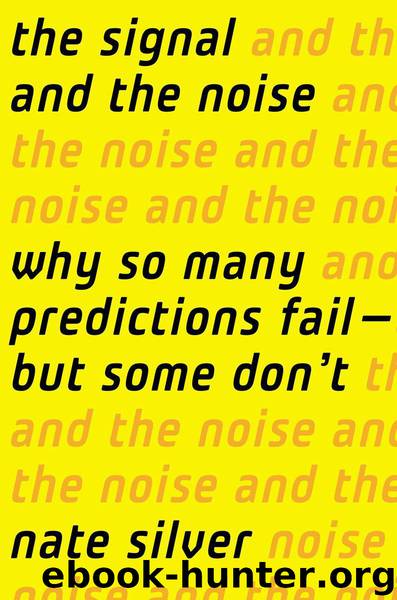The Signal and the Noise: Why So Many Predictions Fail-but Some Don't by Silver Nate

Author:Silver, Nate [Silver, Nate]
Language: eng
Format: mobi, epub
Publisher: Penguin Group
Published: 2012-09-26T16:00:00+00:00
Instead, the final card is the harmless-looking five of spades, which does not complete the flush:
K 9 3 8 5
We bet $250 into the $335 pot, hoping that the Lawyer will call us with a worse hand. Suddenly, however, he springs to life. “I’m all-in,” he says to the dealer in a voice just barely louder than a whisper. He neatly pushes his remaining chips—about $1,200—into the pot.
What the hell just happened? We now need to put our Bayesian thinking skills to the test. If our forecast of his hand range is off, we could easily make a $1,200 mistake.
We look at the board and realize there is one exact hand, one from among the 1,326 random combinations, that seems most consistent with his play. The specific hand is a seven and a six of clubs (7 6). It is a suited connector, so we think he would have called with it before the flop. On the flop, this hand made a flush draw with four clubs, and we didn’t bet enough to push him off it. On the turn, the hand missed its flush but nevertheless became stronger: the 8 that made our hand three-of a-kind gave the Lawyer the possibility of making a straight with any ten or five. If that was indeed his hand, the 5 on the river made his straight, which beats our three-of-a-kind and would explain why he is now betting so boldly.
So should we fold? Even if you have never played poker, it is worth pausing for a moment to consider what you’d do.
The answer is that you should very probably not fold. In fact, against many players, you should be pleased that more money is going into the pot.
The solution comes from Bayes’s theorem. It’s true that the all-in bet is an extremely powerful move—it conveys much more information than his calls before. But before the Lawyer went all-in, we would have assigned a very low probability—perhaps 1 percent—to his holding exactly the seven and six of clubs, just one possible hand out of the myriad combinations. Unless we are extremely confident that the 7 6 is about the only hand that he’d make this play with, folding could be a huge mistake. Our hand only needs to be good about 35 percent of the time to make the call correct mathematically.
In fact, there are some alternate possibilities for his hand. The Lawyer could have a set of threes or possibly a set of fives, which still lose to our set of eights. He could plausibly have made two-pair with a hand like K 5. Some players would play a pair of aces in this way. In his Bayesian model of our hand range, the Lawyer might reasonably figure that hands like this are better than ours even though they are not—good enough to go all-in—and he might be willing to get a lot of money in with them.
There are also a couple of hands apart from the straight which would beat us.
Download
The Signal and the Noise: Why So Many Predictions Fail-but Some Don't by Silver Nate.epub
This site does not store any files on its server. We only index and link to content provided by other sites. Please contact the content providers to delete copyright contents if any and email us, we'll remove relevant links or contents immediately.
Hit Refresh by Satya Nadella(9125)
The Compound Effect by Darren Hardy(8943)
Change Your Questions, Change Your Life by Marilee Adams(7759)
Nudge - Improving Decisions about Health, Wealth, and Happiness by Thaler Sunstein(7692)
The Black Swan by Nassim Nicholas Taleb(7106)
Deep Work by Cal Newport(7063)
Rich Dad Poor Dad by Robert T. Kiyosaki(6608)
Daring Greatly by Brene Brown(6501)
Principles: Life and Work by Ray Dalio(6421)
Playing to Win_ How Strategy Really Works by A.G. Lafley & Roger L. Martin(6236)
Man-made Catastrophes and Risk Information Concealment by Dmitry Chernov & Didier Sornette(6005)
Big Magic: Creative Living Beyond Fear by Elizabeth Gilbert(5754)
Digital Minimalism by Cal Newport;(5749)
The Myth of the Strong Leader by Archie Brown(5499)
The Slight Edge by Jeff Olson(5410)
Discipline Equals Freedom by Jocko Willink(5378)
The Motivation Myth by Jeff Haden(5204)
The Laws of Human Nature by Robert Greene(5172)
Stone's Rules by Roger Stone(5081)
